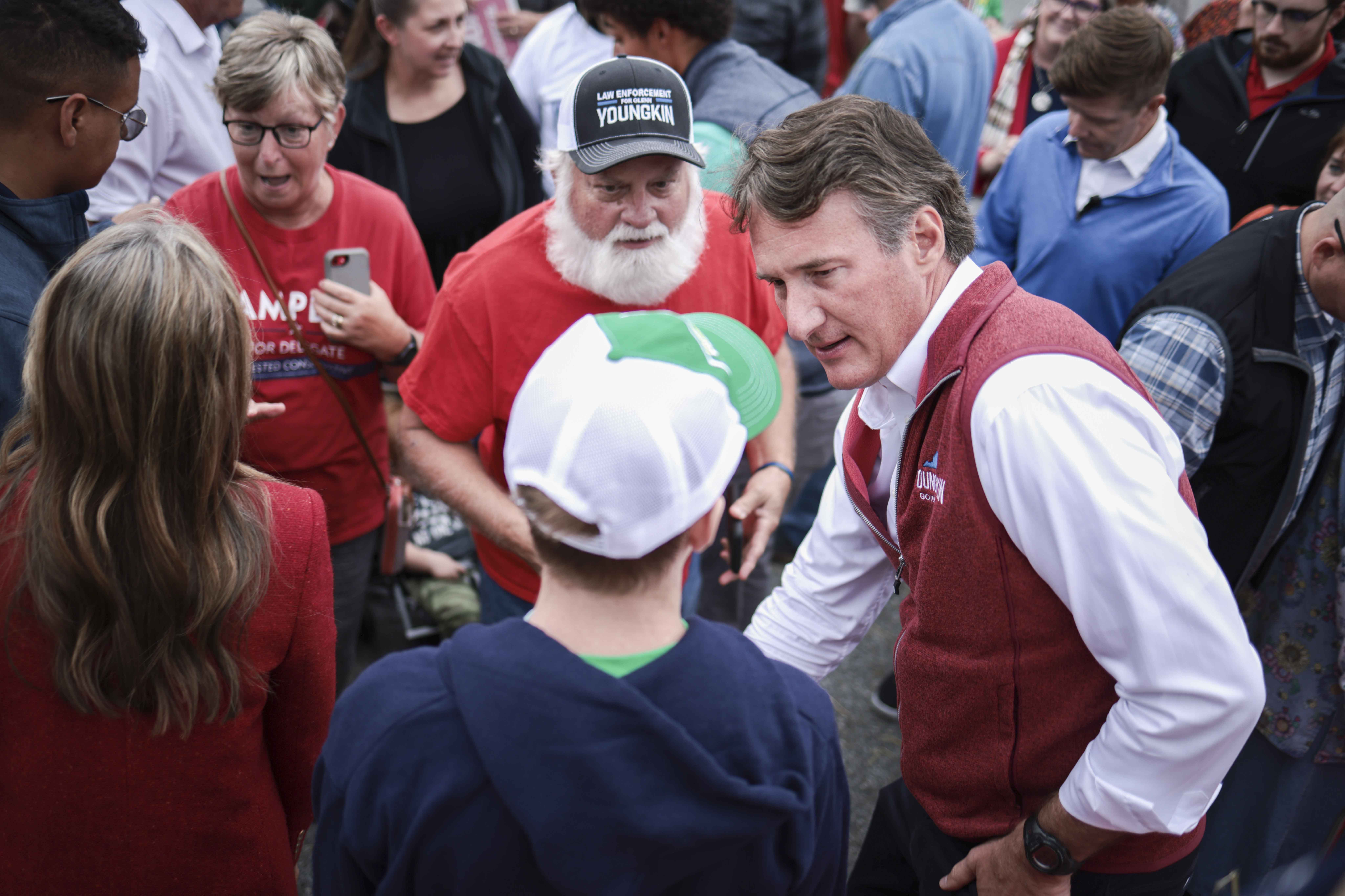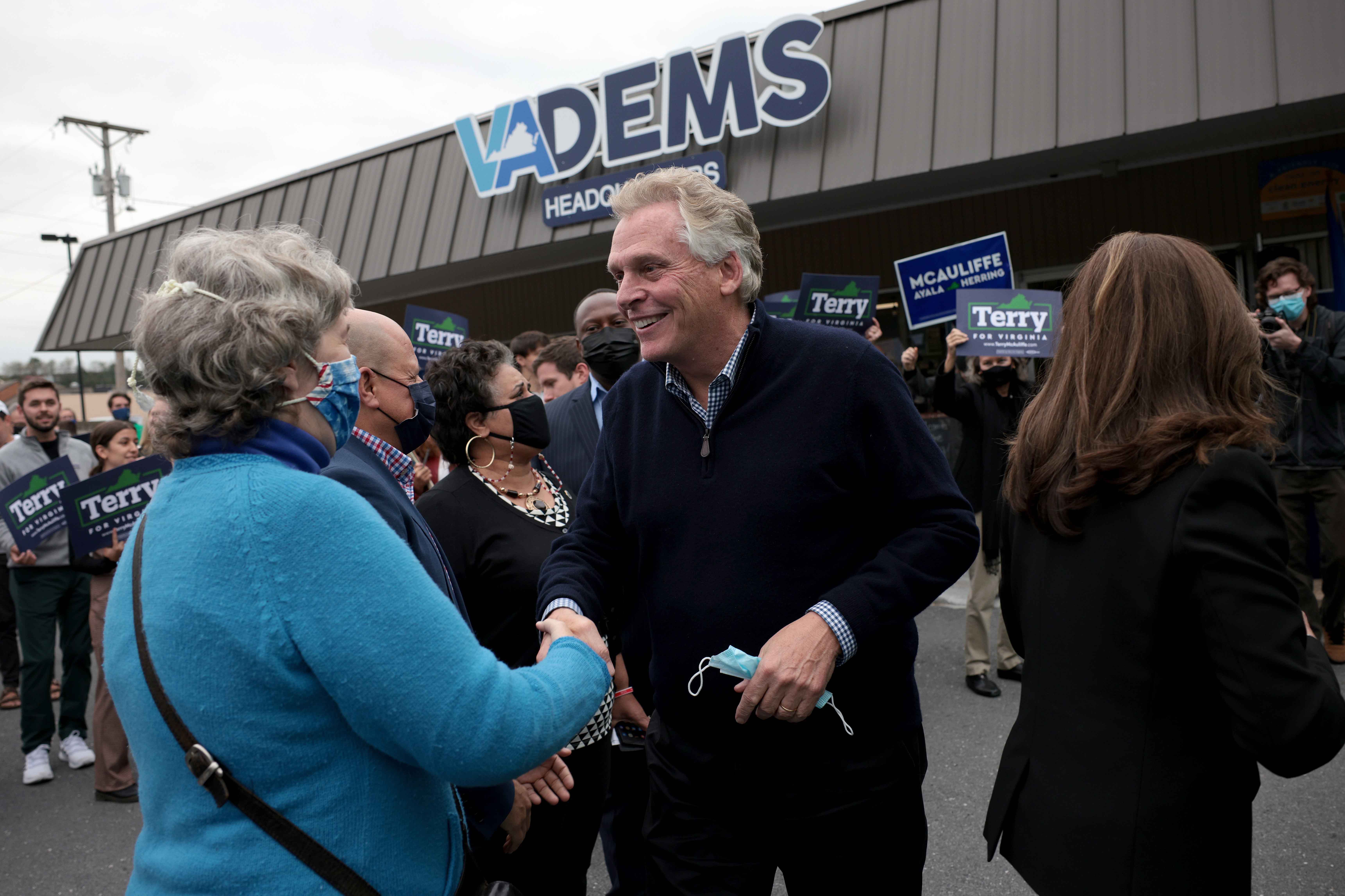Virginia Republicans are fired up — and Trump is on the sidelines

Republicans started the year watching the Senate slip away in Georgia — and fretting that Donald Trump’s takeover of the party was so complete that the base wouldn’t show up for them without Trump himself on the ballot.
Now, those fears have largely evaporated.
Republicans hold an enormous edge in enthusiasm that could make the difference in the upcoming Virginia governor’s race, according to both public and private polling. What’s most notable in Virginia is that it’s Glenn Youngkin — a candidate who accepted Trump’s endorsement but has held the former president at arm’s length during the campaign — who stands to benefit from the electrified GOP base, which is instead animated by President Joe Biden’s sagging ratings and Democrats’ total control in Washington and Richmond.
“The disheartened-ness that I saw following the November election and leading into the Georgia Senate runoff — people saying, ‘What’s the point in voting?’ — that’s shaken off,” said Wren Williams, a GOP nominee for a state legislative seat in southwest Virginia, who defeated a seven-term Republican incumbent for the nomination for not being sufficiently pro-Trump.
Strong turnout next Tuesday among Republicans, especially rural and exurban voters, could be the first major evidence that Trump backers won’t stay home in 2022, when the GOP aims to retake the House and Senate. The big question in Virginia is whether enthusiastic Republicans are enough to conquer the arithmetic of the state. There are simply more Democrats than Republicans in Virginia now, and Democratic nominee Terry McAuliffe, with an assist this week from Biden, has worked hard to tie Youngkin to Trump in order to light up his own base.
Even that nationalization strategy has had drawbacks for Democrats, though, according to Williams: “McAuliffe’s campaign has advertised the fact that Youngkin is Trump, endorsed by Trump, a wolf in Trump’s clothing, and ironically, that’s a double-edged sword because he’s motivating the [GOP] base,” Williams said.
Nick Everhart, a Republican consultant who worked on the Georgia Senate runoffs and is now involved in Virginia legislative races, echoed that there was “real concern after Georgia that there was going to be lingering anger about the election with base Republicans, the concern being Trump’s vocal frustration was sending mixed messaging that would depress turnout.” Instead, Everhart said, there “doesn’t seem to be any long-term hangover post-Georgia, which is incredibly encouraging heading into the midterms.”
“That base anger is, instead, productively being directed at Joe Biden and Democrats on the ballot,” Everhart added.
A lot of things still must go perfectly for Youngkin to pull off victory in a state that Democrats have dominated of late. He has to achieve blowout rural turnout west of the Interstate-95 corridor that cuts through the middle of the state. He has to peel away independents and swing voters in suburban counties. And he must hope that Democrats fail to excite their own base voters, especially in northern Virginia.
Youngkin’s party is also painfully aware that they are fighting the clock: This path to victory may no longer be an option for Republicans going forward in Virginia, as a decline in rural population accompanies enormous growth in Democratic-dominated urban and suburban counties.
“Republicans are going to have a really good night in Virginia next week, but it’s still putting a tourniquet on a gaping wound,” said Jimmy Keady, a GOP consultant based in Virginia, who is working on a slate of legislative and congressional races in the state. “In suburban counties — places like Loudoun County, which has grown by 30 percent, as well as outside of Richmond — the population is trending in the wrong direction for Republicans. Meanwhile, the population of rural areas is disappearing.”
“In the long-term, Virginia is trending blue,” Keady added. “We look a lot like Colorado in 2014, and you can see where Colorado is now.”
The question as to whether Virginia has gone blue or remains a purple state is reflected in each candidates’ strategies. “McAuliffe is leaning into partisanship, leaning into nationalization, a bet that Virginia is just too Democratic,” said Mark Bergman, who was a senior adviser to Democratic Gov. Ralph Northam’s winning campaign in 2017. “Youngkin is saying, ‘No, it’s purple,’ and you do that by winning the suburbs with his campaign painting him as a non-scary Republican.”
The biggest piece of the puzzle for Youngkin — depressed Democratic turnout — is expected to be the most important part of his path to victory, several Virginia and national Republican strategists privately acknowledged.
“Republicans have a fundamental disadvantage in this race: There are more identified Democrats in Virginia, vastly more than existed in 2013, and all Democrats have to do is convince them to show up to vote,” said one national Republican involved in the Virginia race. “The margin of victory among independents will not be great enough to offset the partisan leaning of the state if Democrats fix the enthusiasm problem.”

That’s why Democrats are pulling out all the stops to rile up their own voters, a traditionally difficult task for the party in the White House to pull off a year after winning it. Appearing at a rally alongside McAuliffe, Biden laid into Youngkin this week, calling him an “acolyte of Donald Trump” and casting him an extremist — who, Biden quipped, “can come in a smile and a fleece.” Former President Barack Obama is featuring in direct-to-camera TV ads airing across the state, while Vice President Kamala Harris and Stacey Abrams stumped for McAuliffe in southern Virginia.
But these high-profile pleas may not be enough to rouse voters disappointed by marginal returns following the Democratic takeover in Washington, an electoral ennui brought on by Biden and congressional Democrats’ inability to enact a slew of campaign priorities.
Democrats’ wildest hope, to goad Trump into showing up in Virginia before Election Day, doesn’t appear to have worked, though the former president will phone into an election-eve “tele-rally,” it was revealed Thursday.
Public and private polling show that Republicans are outstripping Democrats in interest in the race.
A Christopher Newport University poll found that 80 percent of Republicans were very enthusiastic to vote, while 65 percent of Democrats self-identified that way. A Monmouth University poll, which found the gubernatorial race deadlocked, noted a “chasm” between the two parties, where Republicans held a 23-point advantage in enthusiasm. And a Fox News poll out Thursday night — the first survey of the race to show Youngkin with a significant lead among likely voters — showed his supporters with a double-digit enthusiasm advantage.
Early vote analysis by TargetSmart, a Democratic data firm, also shows strong participation in early voting in GOP-dominated rural counties — though it’s difficult to derive meaning from those numbers because Virginia recently changed its voting laws, making comparisons to previous elections challenging.
“Across all categories of Republicans — from those who are over Trump, but remain open to Republicans, to the hardcore pro-Trump voters — interest level is extremely high, based on all the internal polls I’ve seen,” said Zack Roday, a Republican consultant based in Richmond who is working on several legislative races. “From suburban to exurban to rural, the enthusiasm is consistent.”
Any disappointment hardcore Trump voters may have felt about Youngkin, who was not seen as the most pro-Trump option for the nomination, runs up against the reality that Republicans haven’t won statewide in Virginia since 2009. Or as one Virginia Republican operative put it: “To a starving man, there’s no bad bread.”
Even so, a group tied to Democratic consultants still attempted to drive a wedge within the party by casting Youngkin as insufficiently conservative, Axios reported. The Accountability Virginia PAC targeted voters through digital ads, likely in an effort to depress turnout.
But Williams, the Republican legislative candidate, said that the party has “all collectively gotten behind and on board the Youngkin train,” and conversations with constituents reflect that unification.
“People say, ‘Look, he may not be your favorite, but he’s not Terry,’” Williams said. “We have to have an incredibly high turnout to offset what happens in northern Virginia, so that has resonated with the base. People understand that.”
Go To Source
Author: POLITICO

